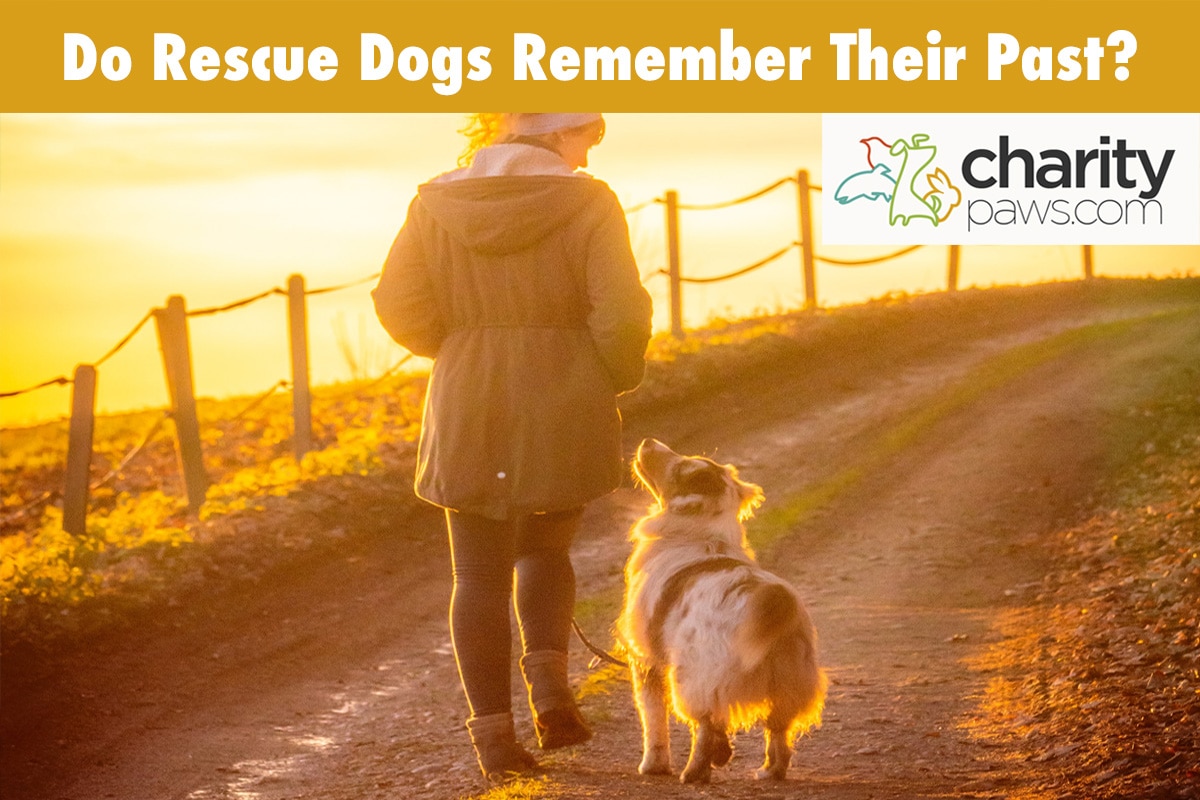Each of our rescue dogs have a past that has led them to where they are today.
While not all rescue dogs have a traumatic history that involves neglect and abuse, the trauma of being abandoned is still just as real.
Because of this, many of us wonder if our rescued pups ever think of their previous lives.
Many rescue dog parents often wonder if their pups remember their previous owners, bad experiences, or even traumatic moments from their past lives.
To help you better understand how canine memory works, let’s discuss the details below.

Can Dogs Have Memories?
Before we answer the question of whether or not a rescue dog can remember their past, it’s important to understand how a dog’s brain works in terms of forming memories.
Dogs do not create memories in the same way that we do, so it’s important for us to truly understand how they look back on their past.
Dogs have three different types of memory, so let’s discuss each one below. This information is collected from multiple studies on canine memory.
Associative Memory In Dogs
Associative memory is one of the most common forms of memory that our pups utilize.
This involves forming emotional connections to certain stimuli, which then creates either a positive or negative association with the stimuli.
This means that while your pup may not remember the specific details of the associative memory that was formed, they often will remember the way the stimulus made them feel in that moment.
Dogs can form associative memories to:
- Locations
- Objects
- People
- Types of animals
- Food
This is why dogs can either become extremely attached to certain toys or foods, or why they will be so afraid of certain objects or animals.
These associations can typically only be resolved when they are able to replace their negative associations with good ones, which in turn helps to ‘erase’ the negative association they previously formed.
An example of how negative associations can impact our pups is a dog that is afraid of men.
They may have had one bad interaction earlier in their life that set the tone for the future, whether this man simply had a loud voice or they actually participated in cruelty against the pup.
These pups may remember how this initial interaction made them feel, causing them to be fearful of all men they meet in the future.
Dogs can get over these feelings once they make positive associations with men in the future, but it can take some time.
Semantic Memory In Dogs
The next form of memory that our dogs utilize is called semantic memory.
This type of memory involves the remembrance of certain information that is needed to move through life, so things like where the food bowl is or how to perform basic obedience tricks.
This is the memory our dogs use throughout your in-home training, as well as learning how to adapt to their new structure and routine in your home.
Semantic memories help your dog remember learned cues for years to come.
This form of memory allows them to store certain words and cues into their brain, allowing them to respond appropriately in the future.
Both semantic memory and associative memory are what our dogs rely on most as they maneuver through life.
Episodic Memory In Dogs
The presence of episodic memory in dogs is still highly debated by researchers.
This type of memory involves reflecting back on previous memories as they occurred, almost as if we are watching them like a movie in our head.
While humans do this often, we are not so sure about dogs.
Most researchers do not think our dogs use episodic memory to recount their previous history, but one study aimed to prove that they actually do.
This study involved encouraging dogs to imitate a human’s actions after a delay, hoping to prove that dogs would playback the previous event in their head and repeat it after a short period of time.
The details of this study are extensive, but the results show that dogs can rely on episodic-like memory when doing so benefits them.
However, this is the first study on episodic memory in non-humans, so more research still needs to be performed.
Ultimately, it’s clear that if dogs do use episodic memory, it is nowhere near as often as associative and semantic memory.
Overall Memory In Dogs
All of this is to say that while we may picture our dogs lounging around and reflecting on their past, this is likely not the case.
The canine brain is vastly different than ours, so we don’t have to worry about our pups thinking about their previous trauma at all hours of the day.
However, it does appear that dogs can be triggered by associations, so previous bad experiences may still impact them to this day.
They just don’t appear to impact them to the extent that we may picture in our heads, and it is rather a response to the stimuli versus the memory.
Now that we understand how memory works in our canine friends, let’s answer the most common questions pet parents have about their rescue dog’s past!
Does My Dog Know I Rescued Him?
Have you ever heard someone say that rescue dogs are the most loving and grateful pups out there?
While many of us will agree with this sentiment, it makes you wonder if our rescued pups actually know that they are rescued from a negative situation.
So does your rescue dog know that you saved them?
The short answer to this question is, maybe. As we mentioned above, dogs can form negative associations with certain people, places, and situations.
The fact that they no longer have any negative experiences in your home may lead to their overwhelming happiness, and therefore, they are incredibly grateful for your love.
Your pup may not understand that you rescued them from their previous life, but they may understand that they have finally found a home in which they can let their guard down.
Do Rescue Dogs Remember Their Past?
As we discussed above, our rescue dogs do not recall the past in the same ways that we do.
While many of us may sit back and think about our previous experiences and memories, the canine brain does not appear to work in that same way.
However, they can be triggered by events or scenarios that bring them back to the feelings they experienced in their previous home.
While our dogs do not play back a scene by scene memory in their heads, they can react to triggers from a previous bad experience.
They may not remember exactly why they are afraid of other dogs, but they can recall the fear they experienced when they were attacked in the past.
Because of this, the dog will develop a negative association with other dogs.
So our dogs don’t necessarily sit and daydream about the past, but they can be pulled back into the feelings they experienced in their previous home.
Does My Dog Remember His Past Owner?
If your dog is face to face with their previous owner, they will likely remember them.
This is a form of semantic memory in our canine friends, as they once had to rely on this face for food and support.
It does not necessarily mean they will be happy to see their previous owner, but they likely will remember them when they are in their presence.
As we discussed above, your dog is not likely sitting around and thinking about their previous owner.
They can certainly experience feelings of unease or anxiety as they adjust to their new family and home, but just know it is likely a result of the change they are experiencing, rather than the specifics of missing their previous life.
Does My Dog Remember Being In A Shelter?
Rescue dogs can definitely be triggered by events that remind them of their previous time at the shelter.
Shelters are often incredibly stressful for most dogs, as they are filled with loud barking and anxious dogs.
Most shelter dogs will form a negative association with the shelter for this reason, and similar scenarios can trigger these negative feelings.
We know that dogs can form associative memories of:
- Places
- Noises
- People
- Animals
This means that anything similar to the shelter setting can cause severe anxiety, whether it is a group of barking dogs or a building that reminds them of the shelter.
Our pups may not recall specific memories from the shelter, but their experiences can lead to an array of negative associative memories.
Can My Dog Remember Trauma?
Many proud owners of rescue dogs wonder if their dog can remember traumatic events from their past.
It’s clear that both negative and positive experiences can make a lasting imprint on our dog’s mind, so traumatic events are certain to make an impact as well.
Dogs may not fully understand their trauma and the details of how it occurred, but their brain will forever remember how they felt in that moment.
Because of this, they can be triggered by similar scenarios or objects involved in these events.
They may not fully understand why they are frightened, but their brain has associated this location with a previous feeling of fear.
Many dogs will need to form new associations in order to combat this fear moving forward.
Does My Rescue Dog Remember Being Abused?

Most rescue dogs will not remember the specific details of being abused, but they can certainly form negative associations with all aspects of this experience.
They can form negative associative memories with the person, place, smells, and sounds that were present during their abuse, which can deeply impact them as they move forward in life.
This causes many dogs to struggle with unique triggers as the years go on, requiring desensitization training to help them build up their confidence once again.
It’s comforting to know that our dogs do not replay the exact moments of their trauma like humans do, but these bad experiences still find a way to creep back into their lives.
Dogs that endure trauma will require specialized care to not only help them move forward without fear, but to help them create positive associations to replace their negative ones.
It will take time, but many of these pups can be rehabilitated.
How Can I Help My Rescue Dog Forget Their Sad Past?
Now that we understand how important positive associations are for traumatized rescue dogs, you can begin to understand why we must create beautiful experiences moving forward.
Creating positive experiences is essential when helping your rescue dog move on from these traumatic events.
This will allow them to override some of these negative feelings that were imprinted upon their mind.
The best way to do this is to fully understand your dog’s past (ask the rescue or shelter questions), identify any triggers or behavioral struggles in your home, and work on desensitizing your pup moving forward.
Every dog will respond in a different way, so it’s important to practice patience and understanding throughout the process.
It’s also important to realize that trauma can be complex for a dog, and not all dogs will overcome their negative associations with a trigger.
For example, some dogs may never do well around other dogs if they were attacked in the past.
If this is the case for your rescue pup, you may simply need to accept the fact that this is not possible for your pup, and find other ways to fulfill their life.
You can also reach out to a skilled canine behaviorist if you would like some additional insight on how to help your pup.
Future Memories Is What Matters Most For Our Rescue Dog
Now that you understand the details of canine memory, you can focus on making your rescue dog’s future a beautiful one!
The future is what matters in these situations, and your rescue dog will be forever grateful for your dedication to helping them move forward.
For every traumatic experience your dog had in the past, you can create a thousand incredible ones!
Final Thoughts
Canine memory is a complex topic, but it’s clear just how much their past can impact their future behaviors.
Many rescue dogs will require additional patience and understanding as they move through life, but your support throughout this journey is all they need to succeed.
If you focus on making their future a good one, your rescue dog will start to open up and new memories will take over bad memories.
- You can also learn more about what to expect from our 3-3-3 rule for rescue dogs.
- What to expect during the first 7 days.
- Looking for a rescue dog? You can find one from a dog rescue near you.

